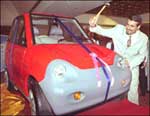Home > Business > Business Headline > Report
Reva plans electric mini-buses, taxis
October 01, 2003 15:15 IST
Last Updated: October 01, 2003 15:39 IST
 After positioning itself as a niche product in the passenger car segment, Bangalore-based Reva Electric Car Company is looking at using the technology for the production of mini-buses and taxis.
After positioning itself as a niche product in the passenger car segment, Bangalore-based Reva Electric Car Company is looking at using the technology for the production of mini-buses and taxis.
"We developed the electric car technology after a seven-year research and development exercise and now are contemplating using the technology for other automobile offerings like mini-buses, taxis and even heavy-capacity vehicles," RECC managing director Chetan Maini said.
Maini said several automobile manufacturers who wanted to use the technology had approached the company.
"Many national and even international firms have approached us in this regard and we are looking at the offers to evaluate whether it would be beneficial to share the technology or go solo," he said.
He, however, refused to divulge any further details.
Currently, electric vehicles fall in a niche low-selling category in the country. Apart from Reva, Bharat Heavy Electrical Ltd offers electric mini-bus and two companies offer three-wheelers.
Maini said RECC, which had so far sold around 500 units of its various variants in the last one-and-a-half years, was aiming at expanding presence to around 15-20 cities by the end of this fiscal apart from plans to pump in an additional Rs 80 crore (Rs 800 million) as investments to increase capacity at its Bangalore plant from the current level of 6,000 units.
"We expect to sell about 1,000 units this fiscal and with a major thrust towards exports as well as a major marketing campaign in the domestic market, aim at sales figures of 400 units a month in the next two years," he said.
The company, which currently offers a power train which can get the car to run for up to 80 kms on one charge with a maximum speed of 60 kms, is eyeing markets like the United States, Britain, Japan, Norway and Switzerland.
"In fact, we have commenced sales in Malta and expect to do so in Britain over the next three months," Maini said.
RECC currently offers three variants which are priced between Rs 245,000 (for the entry-level) and Rs 320,000 for the top-end Classe model.
Denying that it was priced on the upper side, the company Managing Director pointed out the economics of buying a Reva.
"The running cost of a Reva model is just 40 paise per km against that of a similar petrol or a diesel run car which need over Rs 2.50 per km.
"Apart from this, maintenance of a Reva is 40 per cent less than any other car in its class and in the long run, it means savings of hundreds and thousands of rupees over the next five years or so," he said.
Maini, however, said the production cost of the car could be brought down "if the government follows the right policy in respect of our electric car."
"For CNG and other environment-friendly kits like catalytic converters, the import duty is only around five per cent whereas some of the components which we import for manufacturing this electric car attract duties as high as 30-40 per cent.
"Thus if we also receive the same import duty as other environment-friendly products and also the states do away with road and sales tax for our products considering their pollution-free running, the cost can come down by as much as Rs 20,000-25,000.
RECC, which is a 75-25 joint venture between the Maini group and AEV LLC, California and has seen investments to the tune of Rs 80 crore so far.
The company currently has a strength of 180, of which around half are engaged in research and development work.
"We hope to increase our headcount as we further expand our presence in the country," Maini said.
UNI